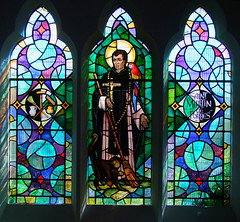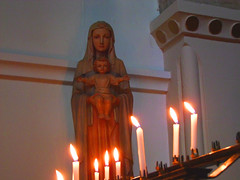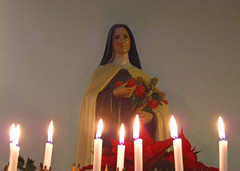| |
|
| |
|
Until its clearance in the
post-war years, the area spreading
eastwards of Ipswich town centre was a
vast slum. The Rope Walk area was
redeveloped and is now home to Suffolk
New College and parts of the University.
The housing in the Cox Lane area became a
car park. I met a man a few years ago who
always tries to park his car on the site
of the house where he grew up.
Two grand red brick churches survive as
islands. The Anglican St Michael is now a
burnt out shell. It was declared
redundant in the 1990s, and in truth it
is hard to see how it can ever have been
needed as more than a triumphalist
gesture, with the parish church of St
Helen only a hundred yards or so away. It
was destroyed by fire in March 2011.
Still standing tall is George Goldie's
1861 Catholic church of St Pancras. Seen
from across the car park, the only clue
that it was once tightly surrounded by
poor people's houses is that there are no
windows in the wall of the north aisle.
As at Brighton's St Bartholomew, this
great ship was designed to sail above
roof tops.
St Pancras looks like a bit dropped off,
and that is exactly what it is. Goldie's
commission was for the huge, recently
demolished School of Jesus and Mary on
the campus of the Woodbridge Road church
of St Mary, and this town centre church
in the same style. St Pancras was
intended to be the start of a church of
cathedral scale, of which the surviving
church was but the chancel. At the time,
Ipswich was in the Diocese of
Northampton. Today, it is in the Diocese
of East Anglia, with a great stone Gothic
cathedral at Norwich. But the Norwich
cathedral, built as the church of St John
the Baptist, and the equally grand Our
Lady and the English Martyrs in
Cambridge, were both begun a good thirty
years after St Pancras. If it had ever
been finished, St Pancras would have been
one of the biggest red brick churches in
England.
The north elevation is stark, that on the
south side rather more comfy, with good
modern glass in the south aisle windows.
The most impressive view is from the
west, where the vast rose window fills in
what would have been the top of the
chancel arch. Here, where the 1970s
parish hall stands, would have been the
crossing tower, with transepts either
side. Looking further west, the nave
would have stretched, and here is perhaps
one of the reasons why St Pancras the
great was never built. Immediately to the
west of the church, across Cox lane,
stands the fortress-like Christ Church.
Although the present building post-dates
St Pancras, there has been a
Congregationalist church on the site for
more than three hundred years, and the
planned Catholic church would have
stretched in front of it. Given the
ecclesiastical politics of the late 19th
century, one can't imagine them giving up
the site very lightly.
The Catholic presence in Ipswich had been
re-established in the 1790s, at the time
of the French Revolution, by a refugee
Priest, Louis Simon. He said Mass in the
home of a rich local lady Margaret Wood,
and then with her help established a
mission church near the Woodbridge Road
barracks. This church, St Anthony, formed
the transepts of the building that still
survives as the parish hall of the 1960
St Mary.
After the re-establishment of the
Catholic hierarchy in England in 1850,
which you can read about on the entry for
St Mary, the plan was to create a town
centre profile for the Church, and this
was why Goldie was commissioned to build
St Pancras. However, anti-Catholic
feeling was rather stronger than it had
been seventy years previously. On a night
in November 1862, the protestant
ministers of the town whipped up such a
state of hysteria that angry mobs ran
through Ipswich smashing windows of
Catholic churches, homes and businesses.
Although the exterior of this building is
rather severe, the inside is a delight,
quite the loveliest Victorian interior in
Ipswich. It doesn't have the gravitas of
St Mary le Tower, or the mystery of St
Bartholomew, but it is a cascade of red
and white brick banding, cast-iron
pillars and wall tiling. Along with the
statues and the candles and the smell of
incense, it is everything a 19th century
town centre church should be.
The post-Vatican II re-ordering of the
sanctuary has not destroyed its coherence
(or, indeed, the traditionalist flavour
of the liturgy here). Above the altar,
Christ stands in majesty, flanked by the
four evangelists. The tabernacle is set
curiously off-centre to the south.
Exposed as St Pancras is in comparison
with many town centre churches, it is
always full of light, and this light
takes on the resonances of some good
glass. The west window was filled with a
design depicting the descent of the Holy
Spirit as recently as 2001, by the
Danielle Hopkinson studio. As a point of
interest, they also did the glass in my
front door. This is unfortunately
obscured by a massive organ (the west
window, not my front door). Below the
west gallery is the baptistery, one of
Ipswich's busiest, and just some of the
church's collection of devotional
statues. In the south aisle are three
sets of triple lancets. The older glass
in the most easterly depicts St Thomas,
St Andrew and St John. The splendid 1974
glass by John Lawson in the other two
sets depicts St Martin de Porres and St
Francis of Assisi.
Not many people live in the parish
itself, but as the busiest town centre
church in Ipswich St Pancras continues to
have a major role to play. Its Masses
attract people from far and wide,
including many from the town's sizeable
minority communities. Perhaps this is
because it does have such a
traditionalist flavour, but also perhaps
because of the work of the tireless and
charismatic Parish Priest, Father 'Sam'
Leeder. 'He's been here for forty years,
and is a familiar character in the town
centre, wandering the streets and talking
to local traders, as well as being the
cornerstone of the town's scouts. Ipswich
would be diminished without him. |
|
Simon Knott, December 2018

  
  
  
   
 
|
|
|

